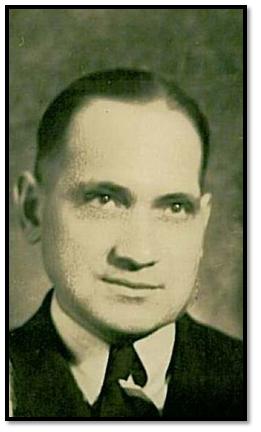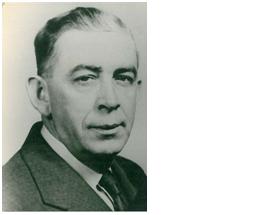Sheriff Govie Smith Resigns
Written by Justin Lamb

Sheriff Govie Smith resigned in 1944 amid corruption charges.
On Monday, July 17, 1944, the Marshall County Fiscal Court met in regular session at the courthouse. Judge Java Gregory opened the court meeting with a bombshell when he announced that Sheriff Govie Smith, who was only in his second year in office, was resigning. When questioned by reporters as to why the Sheriff had abruptly resigned, Judge Gregory refused to comment stating the “matter was done and it was time to move forward.”
However, the people demanded to know why their sheriff had suddenly quit office and it was soon revealed in the Friday, July 21 edition of the Tribune-Democrat that an internal investigation had been conducted which discovered that there were shortages in the sheriff’s accounts. It was also learned that the company that held Sheriff Smith’s bond had been called upon to pay the shortage.
Rumors swirled around town that Sheriff Smith had been taking kickbacks and bribes from the local illegal honky-tonk and roadhouse proprietors. The accusations were a shock to the entire community because Smith had been a very popular and well respected county official.
Before entering county office, Smith was a local car dealer and had served several terms on the Benton City Council. Smith made a run for sheriff in the 1941 Democratic primary. The main issue of the race was the roadhouse issue and corruption was rampant during this time. Federal prohibition was repealed in 1933 and bars and honky-tonks began to open throughout Marshall County. Marshall County passed a local option law banning the sale of alcohol by 1937. However, this law did little to curb the sale of booze, and by the late 1930s, several illegal roadhouses, honky-tonks, and speak-easys were in operation complete with bootleg liquor, slot machines, pool tables, and other sources of gambling. With the arrival of TVA workers to construct Kentucky Dam in 1938, the roadhouses received a new customer base and proprietors of these establishments saw an increase in illegal revenue.
Angry at the lawlessness in the county, calls were made for the sheriff’s office to shut down the illegal establishments, but bribes were given to officers and elected officials to look the other way in order to keep the establishments in full operation. A few small raids were conducted to quiet the public, but no large scale effort was made to shut down the roadhouses. This was the background that led up to the 1941 Sheriff’s race.
Joining Govie Smith in the race was Will Ely and former sheriff Burnett Holland. All three candidates pledged to stamp out the roadhouses and put an end to lawlessness. A majority of voters believed Smith to be the candidate who could best end the roadhouse problem and they elected him with 1,631 votes.
After Sheriff Smith took office in January 1942, he went to work on the roadhouse issue as promised in his campaign. In the first few months he made several bootlegging arrests, and in April, he raided and shutdown “Fat’s Place,” a popular roadhouse on the Paducah-Benton Highway. However, soon after, the raids ceased, roadhouses continued in full operation, and many began to speculate that Sheriff Smith was on the payroll of the roadhouse owners in the county.

Sheriff Walker Myers
By 1944, things caught up with Sheriff Smith when he resigned his office. A call was placed to former deputy Walker Myers about accepting the sheriff’s position until an election could be held. Myers had worked for Sheriff Smith for only a few months in 1942 and had helped lead the raid against “Fat’s Place.” Myers had left for Detroit soon after to seek better employment in Detroit, but accepted Judge Gregory’s offer to return home to be installed as interim sheriff. Myers was elected in a special election in November 1944 and elected to a full term in August 1945. During his five years in office, Sheriff Walker Myers made the elimination of roadhouses a top priority, and by the end of his term, nearly every illegal roadhouse establishment was put out of business.
